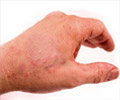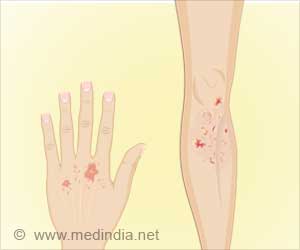Cracks in the skin of eczema patients often set off a chain of allergic diseases that develop over several years. But, protecting and moisturizing the skin may help prevent these allergic diseases, finds a new study.

TOP INSIGHT
Restoring the barrier of the skin as soon as eczema develops is the safest way to stop the atopic march and prevent allergic diseases from developing.
Read More..
Ava has participated in numerous clinical trials seeking better treatments for eczema and a better understanding of the atopic march. "If we can find a solution that will work to stop this before it starts, it will be very rewarding to know that I was able to be a part of that," said Ava.
"Restoring the skin barrier as soon as eczema develops is the best way to stop the atopic march in its tracks and prevent allergic diseases from developing," said Dr. Leung.
The skin forms an important barrier, keeping moisture in and external allergens or microbes out. Research by Dr. Leung has shown that patients with eczema lack important proteins and lipids in the outer layers of their skin. As a result of eczema patients’ defective skin barrier, water escapes from the skin, drying it out and leading to cracking and itching. Cracked, itchy skin is a hallmark of eczema.
Scratching the dry, itchy skin of eczema patients can further damage the skin barrier and activate the immune system. Increasing evidence compiled by Dr. Leung and others indicates that food particles entering the body through cracks in the skin can trigger an allergic response that leads to food allergy. Once that allergic response has been triggered, the immune system is primed to develop not only eczema and food allergies, but also hay fever and asthma.
"It provided him with immediate relief, and each time we do a soak-and-seal treatment, his skin looks so much better," said Kline. "Not only is this making him more comfortable now, but if it can help protect him from allergies and asthma, that is a huge benefit for his future."
A few small studies have suggested that regular treatment with skin moisturizers can help reduce an infant’s chances of developing eczema and the other diseases in the atopic march. Dr. Leung is currently working to confirm those studies and identify the ideal moisturizer components to prevent eczema and the other diseases of the atopic march.
Source-Eurekalert
 MEDINDIA
MEDINDIA




 Email
Email










